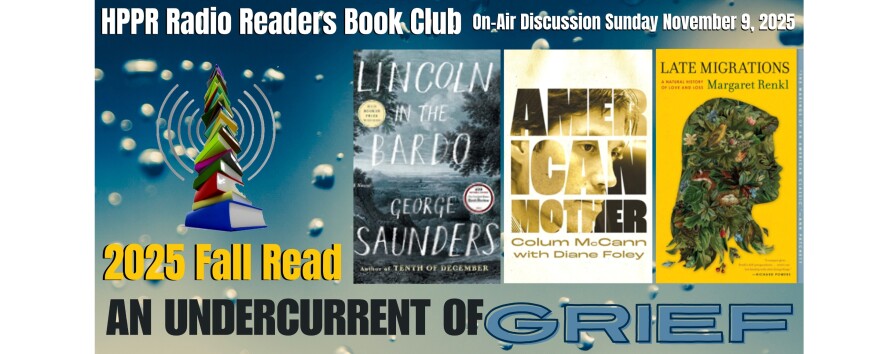This book may contain language, sexual content, and themes of grief and loss, which may be challenging for some readers. Reader caution advised.
Accepting the Finality
by Ryan Brooks
Hello, this is Ryan Brooks, an English professor from Canyon, Texas. I’m on your airwaves today to discuss George Saunders’s zany-but-heartfelt 2017 novel, Lincoln in the Bardo, for HPPR’s Radio Readers Book Club.
As a quick reminder, Saunders’s book concerns a group of graveyard ghosts who try to help Abraham Lincoln’s recently deceased 11-year-old son Willie avoid becoming stuck in the Bardo, a kind of purgatory. To make this happen, the ghosts will have to overcome two forms of denial: Abe’s grief-stricken refusal to admit his son is dead and their own delusional insistence that they are not dead, merely stuck in their “sick-boxes.”.
Just as seeing a distorted funhouse mirror may cause us to reflect on our actual form in the way a normal mirror may not, supernatural elements like those in Saunders’s novel can sometimes cause us to think more critically about our world than old-fashioned realism. In a previous Book Byte, I suggested that Saunders might be using this story of ghosts who deny they are dead to make us think about how we also deny our human mortality and thereby deny the existential freedom that goes with it.
Another, slightly different way of understanding the book’s premise is that Saunders is asking us to think about how, by denying death, we also deny the ways in which we are part of something bigger than the self, both while we are living and after we die. I say this because, at various moments, the book suggests that by clinging to their physical bodies and personal stories, the ghosts cling to an illusory, destructive version of individualism.
The clearest example of this theme occurs when all the ghosts decide to “harness” their “mass power” by collectively possessing Abraham Lincoln, with the goal of compelling him to help Willie’s ghost realize that he is, in fact, a ghost. This process of forming “One mass-mind, united in positive intention,” makes them realize they had once been deeply social beings, part of vibrant human communities, a realization that leaves them feeling “restored somewhat to our natural fullness.”
It seems that the only way for the ghosts to truly rejoin this community is, paradoxically, for them to finally accept they are dead; when one spirit finally allows himself to pass from the Bardo, he remarks: “Whatever that former fellow…had, must now be given back (is given back gladly) it was never mine (never his) and therefore is not being taken away, not at all!”
But, if this is the beautiful way Saunders wants us to relate to questions of life and death, what, if anything, does he have to say about the world of flesh-and-blood presidents, the political world that we continue to live in? Here it’s worth noting how, in one of Lincoln’s internal monologues, the author describes those who reject this vision of a society of equals, calling these forces:
: “… the king-types who would snatch the apple from your hand and claim to have grown it, even though what they had, had come to them intact, or been gained unfairly (the nature of that unfairness perhaps being just that they had been born stronger, more clever, more energetic than others).”
Perhaps, then, Saunders wants us to reflect, like Lincoln, on our collective capacity to fight back against these “king-types,” in whatever form they take.
For HPPR’s Radio Readers Book Club, I’m Ryan Brooks. Thanks for listening!










